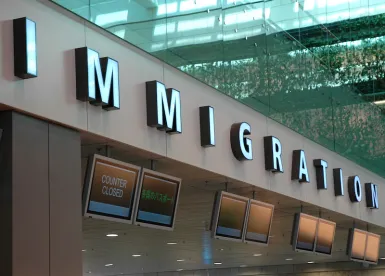Partial Federal Government Shutdown and How It Applies to an Immigration Workforce
On December 22, 2018, the United States government began its shutdown based on the inability of the Executive Office and Congress to agree on funding a wall for the southern border of the country. As a result, many government agencies and services are either on full or partial shutdown. The government shutdown impacts the operation of several immigration-related agencies including the U.S. Department of Homeland Security and its Customs and Border Protection (“CBP”), Immigration and Customs Enforcement (“ICE”), U.S. Citizenship and Immigration Services’s (“USCIS”) Ombudsman subdivisions, and the U.S. Department of State (“DOS”), which runs the consular services that issue U.S. entry visas. Please note that fee-funded services—such as the immigration petitions filed with USCIS and visa processing at the U.S. Embassies and Consulates—should not be affected by the shutdown.
Agencies that may be impacted include CBP as it relates to (1) posting of I-94 entry and exit information provided on its online website; (2) the furloughing of its Admissibility Review Office (“ARO”), which prevents Form I-192 applications for advance permission to enter as a nonimmigrant; (3) CBP offices that allow foreign nationals to visit and correct I-94 entry documents that have errors; and (4) the temporary suspension of the NEXUS program for faster inspections of Mexican and Canadian nationals entering the U.S.
E-Verify—an employment verification website managed by ICE allowing enrolled employers to confirm the eligibility of their U.S. employees—is affected as the website is not being actively managed during the shutdown. Normally, enrolled employers are required to complete the E-Verify process for new hires after completing the Form I-9 within three days of the employment start date. ICE has not provided any guidance regarding how employers can verify new hires through E-Verify during the government shutdown. For now, the recommendation for registered employers is to monitor the E-Verify online website daily, to see when the website is operational. Once it is, these registered employers should submit a query through the E-Verify system to seek guidance on whether they must verify new hires that began their employment during the time the E-Verify system was down.
With regard to DOS, all State Department employees have been ordered back to work starting January 20, 2019. To date, all overseas U.S. Embassies and Consulates are still operating and processing visas. However, some Consulates, such as the U.S. Consulate in Frankfurt, reported a hold on their E visa processing. Since visa and passport operations are normally fee-funded, these services should not be impacted by a government shutdown. If visa operations are affected, Consulates and Embassies may minimize processing of visa applications only to diplomats and exigent life-and-death circumstances. Therefore, if any employee who needs to apply for a new visa—such as an H-1B, L-1, or F-1—is contemplating leaving the U.S. during the shutdown, they would do so at the potential risk that the U.S. Embassy or Consulate may shut down visa processing. We will monitor this issue and make appropriate announcements should there be any updates.
Please note that for those companies that sponsor PERM Labor Certifications and H-1Bs that require a certified Labor Condition Application (“LCA”), the shutdown does not currently affect these processes. These areas are under the control and management of the U.S. Department of Labor’s (“DOL”) Employment Training Administration (“ETA”). On September 28, 2018, President Trump signed a minibus appropriations bill that funds the DOL through September 30, 2019. Therefore, the DOL may continue to process PERM Labor Certifications and H-1B-required LCAs unless the shutdown continues beyond September 2019.
Please watch for future Epstein Becker Green alerts for more information and updates on how the government shutdown affects your immigration workforce.
Update on USCIS’s Proposed New Registration Requirement for H-1B Cap Petitions for Fiscal Year 2020
Last month, our office announced in a Special Immigration Alert that USCIS proposed new regulations that would significantly change how USCIS will process H-1B cap-subject petitions for the upcoming 2020 fiscal year by implementing a registration system. The proposed registration system would take the place of submitting a full H-1B cap petition, which has been the standard filing process in past.
On January 11, 2019, after completion of the commentary period regarding the proposed change, USCIS sent a final version of their proposed regulations on the subject to the Office of Management and Budget (“OMB”). Once the OMB completes their review of the final proposed regulation, a final rule will be published in the Federal Register, at which time the registration requirement will be official and in effect.
We will monitor the status of the proposed regulation and provide updates if and when it becomes effective. In any event, if any employer is contemplating H-1B sponsorship for an employee for this year’s “H-1B cap lottery,” employers should not rely on the new registration process, but initiate the cap cases with their counsel as they have normally done in the past, as soon as possible. Just like previous years, we anticipate H-1B cap filings to exceed the available 85,000 H-1B visa cap numbers.
USCIS I-485 Adjustment of Status Visa Bulletin for February 2019 Changes Its Filing Dates of I-485 Applications Based on DOS’s Final Action Date
For the past several months, USCIS has been using the DOS’s Dates for Filing of Employment-Based Visa Applications as the priority date for accepting I-485 Adjustment of Status applications for U.S. permanent residency (i.e., green card applications). Please note that for February 2019, USCIS will now use the priority dates drawn from the DOS’s Final Action Dates for Employment-Based Preference Cases for any I-485 application filed in February 2019. This change means the ability to file I-485 applications next month for some employees will not be possible if their priority dates retrogress. Therefore, employers should identify I-485 applications that are eligible for filing this month and submit these applications before the priority dates retrogress on February 1, 2019.





 />i
/>i

